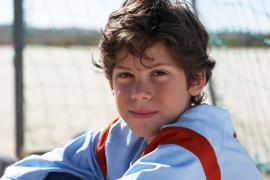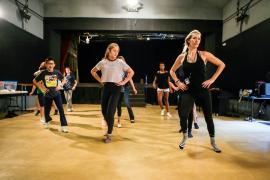“I don’t feel safe discussing this topic, and if a camper wanted to discuss it, I would just tell them that and redirect them to something else.” – Camp Staff 2023
I was leading an important session about some of the backgrounds of the campers we support at camp when a staff member said this to me. It was in response to discussing some of the common experiences these campers may have. (We work with campers from families who face financial barriers, so some of our campers come from challenging home circumstances and situations.) I was stunned. One of the most important parts of being camp staff, in my opinion, is having a desire to support the campers we serve — and one of the easiest ways to do this is to listen. Kids rarely have the chance to share their experience, and here was a staff member who was telling me they wouldn’t listen to the camper because they felt unsafe discussing the topic.
With mental health becoming a topic that is no longer taboo but normalized, we have an amazing generation of camp staff who are comfortable talking about their mental health. Many camps now encourage staff to support their own self-care, not just physically but mentally as well. This has led to staff feeling more comfortable to bring up situations that they feel mentally unsafe in and telling us the change we need to make. We want to encourage this as supervisors. Just like we don’t want to put campers in unsafe situations, we don’t want to do that same thing with staff. However, many staff are quick to label topics that make them feel uncomfortable as unsafe. This is especially dangerous when we think about discomfort. Discomfort is when we often learn and grow.
Discomfort is defined as having a feeling of “unease, [being] anxious or embarrassed.” We learn and grown when we feel discomfort, as we are in what is called the “Zone of Proximal Development”. The Zone of Proximal Development is part of a theory by Lev Vygotzky around how we can encourage learning. When we introduce new ideas and concepts just beyond our current understanding, we are now in a state where we can grow and learn. If we confuse this discomfort with feeling unsafe, we are unable to learn because we reject the change that is about to happen. However, when we navigate the discomfort we are feeling, we learn new skills and can benefit from navigating this situation with new knowledge and experience. As Dr. G states:
…instead of looking at discomfort as some kind of fail, and all danger as proof we should run the other way, we instead do a little “ROI assessment.” Look at the change or the challenge and ask yourself, “If I navigate this successfully, what is the benefit?” If the benefit is highly worth it then call on your resources and your strength to manage the discomfort. If it’s dangerous but worth it, ask yourself and someone you trust, “What safety measures could I put in place? Enough to make it reasonable to try?
This is what we are trying to do with staff training. We are trying to place staff in situations or introduce them to ideas that allow them to grow as youth professionals. We want them to have skills that support the learning we are trying to achieve at camp. We need to ensure that we create an environment where staff feel supported, safe, and ready to try new things so they can learn and grow. Just like with the campers, we can’t just assume staff are ready for this. We must intentionally plan their experience.
Setting staff up to see the value of discomfort is easier said then done! But we have lots of opportunities to encourage this mindset before staff orientation and training, during our initial training, and throughout the summer. We want to focus on two important goals to ensure that we are doing the best we can:
- Encourage staff to be open to trying new things, learning, growing, and working through experiences where they are going to feel discomfort while understanding they are not unsafe.
- Show staff that we are here to support their growth. They are not in an unsafe situation because we are here to support them. We can help provide them with physical, emotional, and other tools to safely work through topics and situations.
Before Training — Start at Day 0!
Staff haven’t even arrived at camp yet, and we can already start encouraging a learning mindset. We can use a few tools to ensure that staff begin to understand the environment we are intentionally creating at camp — one of learning:
- The Pre-Interview Process
What questions do you include in your application that indirectly or directly state that camp is a place of learning? Think about including short-answer questions where staff respond to descriptions of how this will be done. For example, we are a leadership development focused camp, so during the application process we ask staff to respond to the statement “Camp is a leadership development program and focuses on positive youth development. A genuine desire to develop personal leadership skills and lead youth is essential to ensure a positive summer experience.” We are directly stating that staff will be in an environment where learning and growing is a focus, and they need to be, if not comfortable, open to this experience. The question itself might make them feel uncomfortable and be their first opportunity to work through that discomfort. - The Interview Process
We all have versions of questions that we consistently ask: “Tell us about your experience working with children.” “Why do you think you would be a good fit with our community?” This is also an opportunity to describe our camp environment both directly and indirectly. During the initial introductions, I take a moment to let staff know that this job is a growth opportunity. This is our intention. As well, I ask them questions about learning and growing during situations and then directly explain that I’m asking because this will happen at camp. The interview is not just about us as supervisors learning about potential staff; it’s also an opportunity to help potential staff learn about the environment and community we are creating so that they can be more prepared and ensure they feel this is a good fit.
During Initial Training Weeks — They’re at Camp, Now What?
Staff are on-site and excited for the summer. We have ice breakers, sessions on policies and procedures, and a variety of other things we need to cover. We also want staff to learn and grow and realize this is a safe place to do that. How can we encourage staff both to be OK with the discomfort this brings and understand that we are supporting them so that they are safe?
- Trigger Warnings
For many years I was against trigger warnings. I firmly believed that if someone wasn’t OK with uncomfortable situations, they were in the wrong spot. I’ve now changed my mindset to see how these can be a valuable tool in ensuring staff feel safe at camp while experiencing situations that will cause discomfort and learning. Talk about how you will be using these warnings to prompt staff that uncomfortable topics are about to be presented and that qualified staff are here to support them. At the same time, use this as an opportunity to help staff feel comfortable with the discomfort these topics will bring. If they can learn about them and move forward, they’ve gained valuable benefits. Not just the skill we are trying to teach, but also the knowledge that they can safely navigate these topics. - Talk About Unsafe vs Uncomfortable
On day one of training, we talk about our mission. Why are we here? That same day (or at the very start of day two), we talk about the difference between feeling unsafe and feeling uncomfortable and why this is important. Discuss that just like we are going to support campers to feel safe in new situations where they are able to be uncomfortable and grow and learn, we — as a staff team — will be doing this right now. We can role model how to support someone to feel safe and learn while feeling discomfort so that staff can, in turn, do the same thing for campers.
Be direct if need be, and remember to communicate that we are having this discussion because we want to support their growth. If we just talk about the discomfort, this will discourage them. - Debrief, Debrief, Debrief
It’s not just important that we encourage and talk about these situations; we need to ensure staff have a chance to reflect on them. Plan times throughout your day when staff can meet in smaller groups and, with a trained senior staff member, have conversations about how they are doing emotionally and mentally. This is a chance to show staff that we are here to support them and help them feel safe. It also allows staff to reflect on what they’ve learned and how they were able to work through that uncomfortable situation. This means the next time they are presented with an uncomfortable situation (a camper bringing up a tough topic, etc.), they have a reference point to give them confidence that they can work through it.
Throughout the Summer — Training Never Ends
During the summer, we want to intentionally build time into our schedules for staff to review these topics and, if they’ve worked through or encountered uncomfortable situations, process them. Camp is busy, and this may initially seem very hard. However, we most likely have already built in times when these topics can be covered. We all have staff meetings at camp. During these meetings, encourage staff to share how they’ve grown and learned from situations that have been uncomfortable while respecting camper privacy. We already have some sort of coaching and evaluation plan in place at camp. Are we ensuring that supervisors set aside some time during these sessions to allow staff to share?
As I already mentioned, camp is busy. It is OK to let staff know that if they need a larger conversation to work through a situation, we are there for them, just not in that moment. We need to ensure that we schedule time for them to have this conversation though. It allows them to feel supported and safe while having a conversation that helps them learn and grow.
One Step at a Time!
None of these changes are going to happen overnight. For some of these, it may be too late in the season to implement them this summer. Most of your hiring may be done, you might have already planned training, or you may not be sure how you can possibly fit all this in with campers present this summer! Start with one of these things and slowly build. Then put this on your “revisit in the fall” pile. Just like the staff we want to support, we are not going to grow and change overnight. It is OK to feel overwhelmed at times; that is natural. Remember: this discomfort means we have an opportunity to learn and grow. If we can do it, so can the staff we hire!
This blog was written on behalf of Project Real Job whose purpose is to support camps in their efforts to recruit, hire, and retain staff.
David Borsook is currently employed at Moorelands Kids as the camp director and has over 10 years’ experience working in outdoor education. After graduating from the University of Toronto with an HBSc, he completed his BEd at the University of British Columbia. He has presented in a variety of settings, such as the OCA [Re]Connects Conference, and is currently a trainer for the LEAD Camp Mental Health Certification and CPI’s Non-Violent Crisis Intervention Blue Card. David has worked in a variety of camp and educational environments with children from wide-ranging backgrounds and needs. He has a passion for empowering youth of all ages to realize their potential and become the positive leaders of tomorrow. David can be reached at [email protected].
Photos courtesy of Sherwood Forest Camp, Lesterville, MO.
The views and opinions expressed by contributors are their own and do not necessarily reflect the views of the American Camp Association or ACA employees.




